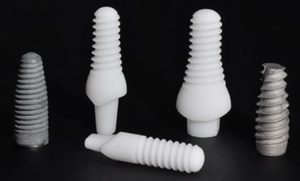I have had my dental implants placed about ten years ago. I keep reading about these advances in the technology. I’ve got two on my bottom left and one on the upper right. I’m about to need another one and wondered if I should just go ahead and switch out the rest of them at the same time. If so, what are your thoughts on the zirconia dental implants?
Dean
Dear Dean,
Most of the dental implants used ten years ago were made of titanium. There is abundant data that these are very biocompatible and will last for a lifetime if well cared for. The only part that will still need replacement, even with care is the crown that tops it. You may find that they need to be replaced every ten years or so.
Should You Replace Your Dental Implants?
Replacing dental implants is not as simple as taking the old ones out and putting in new ones. Because the dental implants integrate with your bone, there will be some bone loss when you extract the implants. That bone is essential to the retention of any new implant placed. In order to have enough bone again, you will need to do a bone grafting porcedure. That means a surgery to remove the implants. A surgery to get the bone grafting done. Then, a surgery for the new dental implants. That is three different chances for something to go wrong. At the moment your dental implants are just fine, so I am not sure it will be worth the trouble, expense, and risk of doing the multiple surgeries.
The newer implants are made from zirconia rather than titanium. Honestly, though, most dentists still use the titanium implants because they have been studied for decades and have a phenomal long-term success rate. Zirconia implants could be fine, but they have not been studied as long.
In your place, I would keep the current implants while they are still working fine and, if you want to, you can get the newer zirconia implant for the tooth you need to replace currently.
There are things you can keep an eye on for your other implants and if they show signs of failing, then you can go ahead and replace them then.
- Discomfort and difficulty biting
- Pain and discomfort around the implant
- The implant shifting or loose
- Gums receding around the implant
- Swollen or inflamed gums
This blog is brought to you by Duluth, GA Dentist Dr. David Marion.

